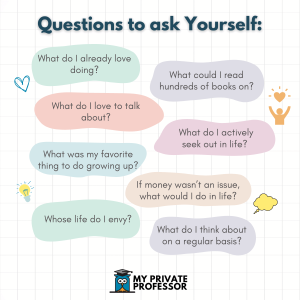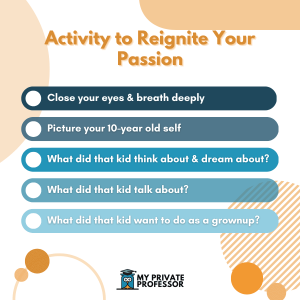“Passion” seems to be something to which we attach great importance.
And evidently, when you feel like you don’t have one, having that passion may seem even more important.
You always hear that the true key to living a happy, fulfilling life is finding the one thing that brings you joy and deep meaning—your passion—and then pursuing it.
But often, it’s unclear how you’re actually supposed to get there.
Sometimes the media represents passion as something you’re born with, or something that just falls into your lap. But in reality, you might feel like you need to search for it. And I can bet you’re not alone with these feelings.
As a student, you may lead a hectic life, with all the social events, club fairs, and academics. Or you might just be busy navigating the ups and downs of school, with seemingly no time to search for your passion.
Luckily, there are several ways in which you can work towards identifying your passion(s). (*And fortunately, these don’t require spending lots of money!)
Reflect
Generally, you have a lot of external sources of influence when it comes to identifying your passion. You’ll hear a friend discussing their newfound interest in evolutionary theories; or you’ll watch a movie in which the protagonist discovers her love for journalism.
All of the people around you and the sources of media that you consume can influence your ideas regarding what you want to do with your life.
That’s why it’s so critical to take some time for you and only you, and reflect on what actually excites you in life.
If you’re having trouble getting started, here are some prompts you can give yourself:
What am I curious about?
Are there things that I regularly think about?
What consistently piques my interest?
What have I enjoyed learning about most in my life?
Read
Reading doesn’t only have to be a dreadful task that you associate with lecture halls and discussion questions. It can also be a medium for learning and ultimately discovering your passion.
One of the great things about reading is that even if you don’t enjoy a particular book, you’ll still usually find that you learned something. And if you didn’t like the book, or more accurately, found the topics downright boring, then you can rule out potential areas of interest.
Catch up with your friends
Connecting with your friends, even if just to catch up at lunch, can help you tap into your interests. You may inadvertently just end up talking about something so captivating, that, a-ha…you’ve found a new passion.
We’re social creatures. And interacting with others is not just a privilege—it’s a necessity. Turns out, loneliness can be detrimental to your wellbeing—and crazily enough, even deadly.
The fact is, we need human connection to survive, thrive, and grow.
And if you have people in your life who you actually enjoy spending time with? That’s just the icing on top of the cake. Take advantage of it!
Explore the internet (or, the library)
Although you may find yourself going down many holes and paths, the internet really is your best friend if you’re feeling lost. One thing that’s so great about the internet is that it unites people from all around the world.
And many of these people, like you, may be searching for their passion.
It’s encouraging to recognize that you’re not alone in this, and that others are also looking to understand what they should do in this life.
Utilize everything at your disposal: blogs, forums, Ted-Talks, podcasts, videos, etc. And if you don’t end up finding your passion, you’ll still learn a few things after scavenging the internet.
Force yourself to be bored
If you’re searching for too long, or just exerting too much brain power, you’re going to drive yourself crazy. And you may find your motivation and concentration majorly dwindling.
Instead of trying to push through the stone wall, get bored. I mean it!
Doing mundane tasks such as folding laundry or washing dishes actually majorly engages your brain—that is, if you allow yourself to truly just do the mundane task (without doing something else simultaneously, like scrolling).
A study in the journal Academy of Management Discoveries showed that boredom can stimulate both productivity and creativity. How does this happen?
When you allow your brain to wander—your brain uses its default network. When in the default network, you may be daydreaming, thinking about the past, or imagining the future.
And it’s during this time that you often come across your most creative ideas.
In fact, research has found that the default network is directly related to creativity. So cherish your “boredom”! Embrace your walk to the garage, or your break in between Zoom meetings, and welcome the times in your day that allow you to tune into that default network.
Exercise
I sometimes find myself pushing off exercise in an attempt to get all of my work done on time. But over time, I’ve learned that my brain actually deos function better after getting some exercise. Yeah, yeah, all those health articles aren’t just yanking your chain.
Exercise helps boost both memory and thinking, both of which are key ingredients for cognitive success.
Physical exercise directly impacts the brain by reducing its insulin resistance and inflammation, and stimulating the release of growth factors (chemicals that impact brain cells, new blood vessel growth, and the survival of new brain cells).
In non-scientific jargon: exercise increases blood flow to the brain. As a result, your brain receives more oxygen and nutrients and releases beneficial proteins in the brain. The result is a healthier brain!
Plus, indirectly, exercise can boost your mood and sleep, and mitigate stress and anxiety. Think about it: when you’re in a bad mood, sleep-deprived, stressed, and/or anxious, are you engaged and productive?
Considering all of the above benefits, it should be fairly clear how exercise can help get you out of your slump and back on track in your journey to find your passion.
Try out different activities
Often, as unfortunate as it seems, you’ll find that although you enjoy your current job, it might not actually center around something you consider your passion. In many cases, it seems that we identify our passions when we try new things.
So a hands-on, active approach to finding your interests can help you find your passion. And dedicating some of your time to trying out new activities is a great way to do this.
A passion can, but doesn’t have to be what you end up doing in your career. For some people, having a career that’s centered around their passion simply isn’t possible (whether for financial or different reasons).
If this sounds like you, do some digging into lifelong learning, and learn about how adopting this type of approach can benefit you.
Final thoughts
It’s perfectly ok if you find that your passion is something that doesn’t relate to your current job. Because in most cases, you can still find ways to incorporate it into your life. And hopefully, once you’ve identified a passion, you’ll feel a little more excited about life—even on your most mundane days.
The important thing to remember is that you have your entire life to identify your passions. Also, consider reframing your perception around this seemingly major concept, a passion.
Instead of thinking about it as something that you have to search for, grab onto, and then you’re done, remember that you can always continue developing your passions.










